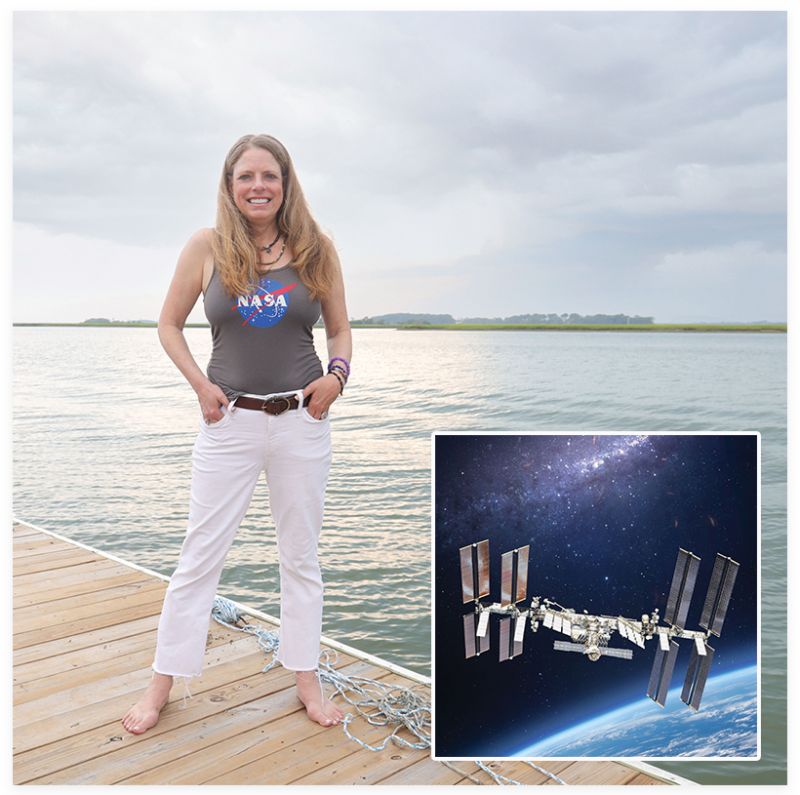Find out how Donna Roberts is nurturing the next generation of space travel

Donna Roberts was recently named the deputy chief scientist for the International Space Station National Lab (inset).
After Donna Roberts began to suspect that long-duration space travel caused lasting neurological effects, she took action. The Georgetown-bred scientist (educated at Clemson, with a master’s degree in electrical engineering from the University of Colorado) left her job at NASA and enrolled at MUSC. After earning her doctorate and completing her residency in radiology and a two-year neuroradiology fellowship, Roberts joined the faculty at MUSC in 2006, and began leading research that changed our understanding of how space affects the brain. “NASA has been studying what happens to the heart and the immune system (since the start of the space program), but nobody was looking at the brain,” says Roberts.
She cofounded the Aerospace Medicine program at MUSC, where studies have included parabolic zero-gravity flights, with transcranial magnetic stimulation of participants before and after the experience. Around 2010, when astronauts returning from the International Space Station (ISS) complained of ongoing vision issues, NASA began conducting brain MRI scans, and Roberts’s decades of efforts were validated.
Roberts’s passion for space took off when she read the young adult book Stowaway to the Moon as a child. Living in the Lowcountry has served her career, giving her a “front-row seat” to Space X launches visible from our beaches.
Although Roberts’s research has found that long-duration space travel of five to six months has a negative effect on the brain, she remains a proponent of space exploration and is committed to keeping humans healthy. This summer, she begins a new chapter as the deputy chief scientist for the ISS National Lab. While her role requires a move to Washington DC, Roberts plans to spend much of the year in Charleston on her sailboat that’s docked at her riverfront lot on Folly Beach. (Her 17-year-old daughter attends high school here.) MUSC’s Aerospace Medicine division will continue research on how to keep people healthy in space, while she focuses on ensuring that space travel and research persist.
With the federal government planning to decommission the ISS in 2030, Roberts’s goal is to promote economic opportunities in space that will encourage continued private and government funding. “If in 2030, we don’t have enough commercial interest in low-Earth orbit—to the point where companies are developing their own space stations—then we could lose low-Earth orbit capability,” says Roberts. “It’s my job to help prioritize the resources with the most potential to lead to economically viable applications.”
Jeff Bezos’s Blue Origin, as well as other companies, are at work on a new space station, but customers will need reasons to use the facility beyond tourism-based travel, such as medical and agricultural research. “If we can stimulate an economy in low-Earth orbit where we see commercial space stations popping up, that will open the door to costs coming down and allow more people to go to space,” says Roberts.
When the next SpaceX civilian mission, Polaris Dawn, which is planning to send humans in orbit for up to five days, launches later this year, Roberts will be on-site in Florida to conduct before-and-after brain scans of the astronauts. She believes the data will help scientists better understand the potential for long-term effects, which can help ensure space travel is safer by updating space suits, physical therapy, and other technology. “My dream is that we go out and explore the universe, go back to the moon, and go to Mars,” says Roberts. “The only way to do that is to keep humans healthy in space.”
Watch Donna Roberrts's TEDxCharleston talk about your brain in space: